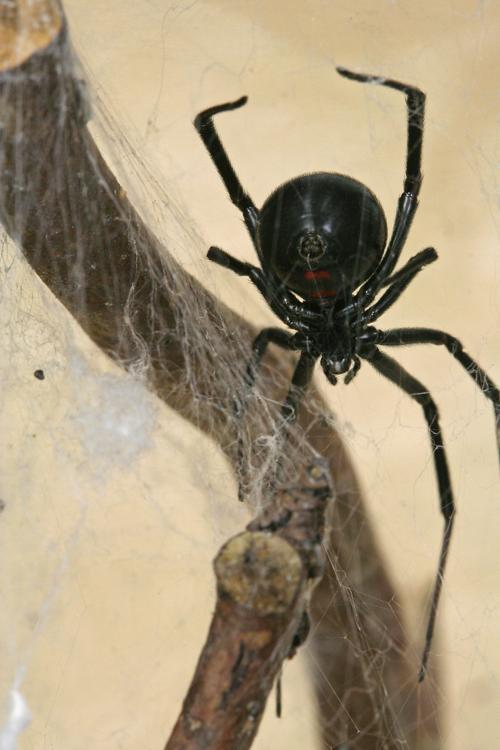Q: My question is about black widow spiders. We have been told that they are difficult to get rid of and we have had several on the outside of our home. Their web is different from most spiders so even if I see a black spider and the web is similar I kill it without checking for the red hourglass. I’m quite concerned for my grandchildren when they are here visiting, and my husband who loves to garden. First off are there black spiders that are look-alikes and should I also threat them with the same caution? What is the best way to get rid of them along with the eggs they lay? We have the outside perimeter of the house sprayed twice a year and the line of death has worked for the insects we don’t want in the house. However, walking into a spider web of any kind has me really uneasy.
A: The western black widow spider (Lactrodectus hesperus) is fairly unique in its coloration for our area so there are no lookalikes to be seen. There is a false black widow that is not venomous but it is found in southern California and other pacific coast states, primarily in urban areas as a house spider. Their color is more purplish-brown with pale yellow markings. The body of the black widow female is shiny and black and the hourglass mark on the underside is red.
The good news about black widows is that they are not aggressive and not seeking to bite humans. You are correct about them being hard to eradicate so part of being safe is teaching your grandchildren what they look like and to avoid handling them. Wearing gloves while working in the garden is always a good idea to protect against accidental encounters with black widow spiders and other things.
Perimeter pesticide sprays are not a good way to manage insects and spiders because they won’t provide long-term control. These days many pesticides degrade fairly quickly in the environment so spraying twice a year for no specific reason is basically recreational pesticide use. It is better to spot treat where and when you see insect pests so you get the best bang for your buck and so you don’t unnecessarily kill off good bugs that could be helping you manage other pests.
Reducing clutter around your home is one of the easiest ways to minimize encounters with spiders and other arthropods. Outdoors this often means keeping weeds and other vegetation under control and reducing piles of anything such as firewood or moving piles to outlying areas.
Outdoor lighting will attract insects and the spiders that eat them so you have to balance the safety of having lighting with keeping the lights from shining directly on structures. Because they are nocturnal you can hunt for spiders at night and dispatch them with your shoe or whatever tool you prefer. You can also remove them to an area away from your home if you want to be nice to them. After all, they are eating insects that might otherwise bother you so they’re not all bad.
Peter L. Warren is the urban horticulture agent for the Pima County Cooperative Extension and the University of Arizona. Email: plwarren@cals. arizona.edu





